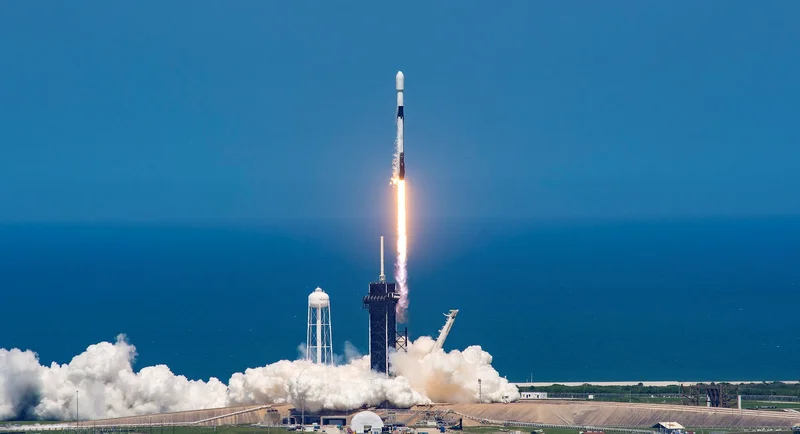SpaceX Launch: Schedule, Starship, and What to Expect
Julian Vance: The Data-Driven Truth About Space
[Generated Title: Is SpaceX Really Winning the Space Race, or Just Launching More Stuff?]
SpaceX continues to dominate headlines with a flurry of launches. This week alone, we've seen a Falcon 9 carry the Sentinel-6B ocean-mapping satellite from Vandenberg Space Force Base (a mission for Europe and NASA) and two separate Falcon 9 launches from Florida's Space Coast, both hauling Starlink satellites. That's three launches in a single week. The raw numbers suggest a clear victory for Elon Musk's company, but is it really that simple?
Launch Frequency vs. Meaningful Innovation
The sheer volume of SpaceX launches is undeniable. The article states the two Starlink missions from Florida were the 145th and 146th Falcon 9 missions of the year. Let's just digest that number for a moment. One hundred forty-six launches – that’s an average of nearly three launches per week. The vast majority of these are dedicated to building out the Starlink megaconstellation, now boasting over 8,900 operational satellites.
But volume doesn't automatically equate to innovation or strategic advantage. The Sentinel-6B launch, for example, is arguably more significant in terms of scientific impact. It's part of a billion-dollar international mission to monitor rising sea levels, continuing a decades-long effort. The satellite uses radar to measure sea heights to within roughly an inch across 90% of the world's oceans. The data underpins navigation, search and rescue operations, commercial fishing, and flood predictions. It's a crucial piece of infrastructure. (And yes, someone should probably tell mission control that climate change is a factor driving rising sea levels, despite what Trump-era policies dictated.)
The question becomes: is SpaceX primarily a launch provider, or a driver of fundamental breakthroughs? While their reusability technology is impressive – the Falcon 9 first stage, serial number B1097, making its third flight and landing successfully – it primarily drives down costs, not necessarily pushing the boundaries of space exploration itself.
Blue Origin: A Distant Second, or a Looming Threat?
Jeff Bezos' Blue Origin is often portrayed as lagging behind SpaceX. And to some extent, that's true. They've focused on space tourism with the smaller New Shepard rocket (remember Katy Perry singing in space? That was them). But the recent launch of the New Glenn rocket, carrying two NASA spacecraft to study Mars' magnetic field, signals a potential shift. Blue Origin latest: Big win for Jeff Bezos as rocket booster lands back on Earth after Mars mission launch

More importantly, Blue Origin managed to land the New Glenn booster stage on a floating platform – achieving reusability, just like SpaceX. This is a critical step. Reusability dramatically reduces the cost of putting satellites into orbit, from around £48,000 a kilogram with the space shuttle to just over £1,000 with the SpaceX Falcon Heavy. (Though, I suspect that £1,000 figure is a bit optimistic, even for SpaceX.)
The article points out that Blue Origin is also entering the broadband satellite market with Project Kuiper, directly competing with Starlink. This is where things get interesting. It's not just about launch frequency; it's about capturing market share in the burgeoning space-based internet sector. The potential revenue streams from providing mobile and internet coverage globally, and securing an alternative route to undersea cables, are enormous.
And this is the part of the analysis that I find genuinely puzzling. If NASA is truly unhappy with SpaceX’s progress on Starship, as the article claims, and is considering reopening lunar lander contracts, it suggests that Blue Origin might have a shot at a major upset. It would be a huge win for Bezos.
The Data Missing From The Narrative
What's conspicuously absent from these reports? Detailed cost breakdowns. We see launch frequency, payload weights, and mission objectives, but very little hard data on the actual profitability of these ventures. How much does each Starlink launch actually cost SpaceX? What are the profit margins on the Sentinel-6B mission? These are the numbers that would truly reveal who's "winning" the space race.
Similarly, the articles mention the "billion-dollar international mission" for Sentinel-6B, but don't break down the cost allocation between the US and Europe. A 50/50 split is mentioned in one article, but without a specific citation, it’s hard to confirm. This lack of financial transparency makes it difficult to assess the long-term viability of these projects.
Just Launching More Stuff?
SpaceX's launch cadence is impressive, no doubt. They launch a lot of rockets. But the real question is whether all those launches are translating into sustainable profits and genuine technological leadership. Blue Origin is playing catch-up, but their recent successes suggest they shouldn't be discounted. Ultimately, the "winner" will be determined by who can control costs, capture market share, and deliver tangible value – not just by who can launch the most rockets.
Tags: spacex launch
Daniel Driscoll and the Army Overhaul: What We Know
Next PostMetaMask: What is it, is KYC coming, and why should I care?
Related Articles
